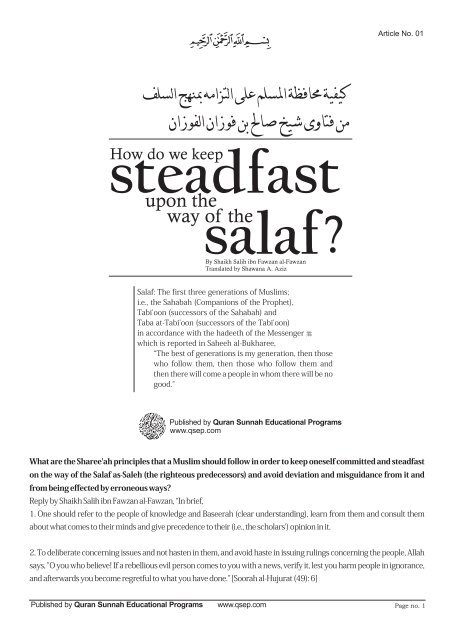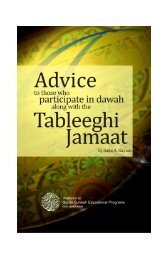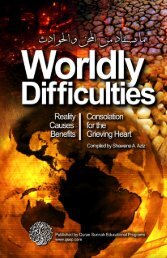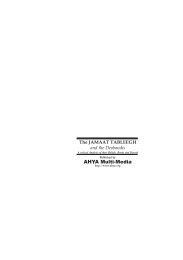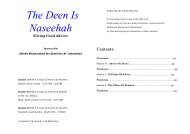How do we keep Steadfast upon the Way of the Salaf ... - QSEP
How do we keep Steadfast upon the Way of the Salaf ... - QSEP
How do we keep Steadfast upon the Way of the Salaf ... - QSEP
You also want an ePaper? Increase the reach of your titles
YUMPU automatically turns print PDFs into web optimized ePapers that Google loves.
Article No. 01<br />
<br />
<br />
steadfast<br />
<strong>How</strong> <strong>do</strong> <strong>we</strong> <strong>keep</strong><br />
<strong>upon</strong> <strong>the</strong><br />
way<br />
salaf<br />
<strong>of</strong> <strong>the</strong><br />
By Shaikh Salih ibn Fawzan al-Fawzan<br />
Translated by Shawana A. Aziz<br />
<br />
<strong>Salaf</strong>: The first three generations <strong>of</strong> Muslims;<br />
i.e., <strong>the</strong> Sahabah (Companions <strong>of</strong> <strong>the</strong> Prophet),<br />
Tabi'oon (successors <strong>of</strong> <strong>the</strong> Sahabah) and<br />
Taba at-Tabi'oon (successors <strong>of</strong> <strong>the</strong> Tabi'oon)<br />
in accordance with <strong>the</strong> hadeeth <strong>of</strong> <strong>the</strong> Messenger <br />
which is reported in Saheeh al-Bukharee,<br />
“The best <strong>of</strong> generations is my generation, <strong>the</strong>n those<br />
who follow <strong>the</strong>m, <strong>the</strong>n those who follow <strong>the</strong>m and<br />
<strong>the</strong>n <strong>the</strong>re will come a people in whom <strong>the</strong>re will be no<br />
good."<br />
Published by Quran Sunnah Educational Programs<br />
www.qsep.com<br />
What are <strong>the</strong> Sharee'ah principles that a Muslim should follow in order to <strong>keep</strong> oneself committed and steadfast<br />
on <strong>the</strong> way <strong>of</strong> <strong>the</strong> <strong>Salaf</strong> as-Saleh (<strong>the</strong> righteous predecessors) and avoid deviation and misguidance from it and<br />
from being effected by erroneous ways<br />
Reply by Shaikh Salih ibn Fawzan al-Fawzan, “In brief,<br />
1. One should refer to <strong>the</strong> people <strong>of</strong> knowledge and Baseerah (clear understanding), learn from <strong>the</strong>m and consult <strong>the</strong>m<br />
about what comes to <strong>the</strong>ir minds and give precedence to <strong>the</strong>ir (i.e., <strong>the</strong> scholars') opinion in it.<br />
2. To deliberate concerning issues and not hasten in <strong>the</strong>m, and avoid haste in issuing rulings concerning <strong>the</strong> people, Allah<br />
says, "O you who believe! If a rebellious evil person comes to you with a news, verify it, lest you harm people in ignorance,<br />
and afterwards you become regretful to what you have <strong>do</strong>ne." [Soorah al-Hujurat (49): 6]<br />
Published by Quran Sunnah Educational Programs<br />
www.qsep.com<br />
Page no. 1
"...Verify (<strong>the</strong> truth), and say not to anyone who greets you (by embracing Islam), 'You are not a believer' - seeking<br />
<strong>the</strong> perishable goods <strong>of</strong> <strong>the</strong> worldly life. There are much more pr<strong>of</strong>its and booties with Allah. Even as he is now, so <strong>we</strong>re<br />
you yourselves before till Allah conferred on you His Favors (i.e. guided you to Islam), <strong>the</strong>refore, be cautious in<br />
discrimination. Allah is Ever Well-Aware <strong>of</strong> what you <strong>do</strong>.' [Soorah an-Nisa (4): 94]<br />
'be cautious' means verify what reaches you.<br />
3. Then if what has reached you is verified and established, <strong>the</strong>n it is to be treated in a manner that will rectify and reform<br />
and not in a manner that is violent or complicated. Allah's Messenger said, "Give good tidings to <strong>the</strong> (people) and make<br />
things easy (for <strong>the</strong>m), teach (<strong>the</strong>m), and <strong>do</strong> not repel (<strong>the</strong>m)." [Saheeh Muslim (4960)]<br />
In all circumstances, issues are to be treated with wis<strong>do</strong>m, deliberation and patience, and it is not suitable for<br />
every person to plunge into subjects in which he has no authority or expertise.<br />
4. Similarly, it is from <strong>the</strong> principles that one equips himself with <strong>the</strong> beneficial knowledge through attending <strong>the</strong><br />
ga<strong>the</strong>rings <strong>of</strong> <strong>the</strong> people <strong>of</strong> knowledge and paying attention to <strong>the</strong>ir opinions, and reading <strong>the</strong> books <strong>of</strong> <strong>the</strong> <strong>Salaf</strong> as-Saleh<br />
and biographies <strong>of</strong> <strong>the</strong> reformers from <strong>the</strong> <strong>Salaf</strong> <strong>of</strong> this Ummah and its scholars –<br />
<strong>How</strong> <strong>the</strong>y solved issues, exhorted and admonished<br />
<strong>How</strong> <strong>the</strong>y used to enjoined <strong>the</strong> good and forbade <strong>the</strong> evil<br />
and <strong>the</strong>ir manner <strong>of</strong> giving rulings concerning issues.<br />
All this has been recorded in biographies and past narratives <strong>of</strong> what occurred in <strong>the</strong> lives <strong>of</strong> reformers, "Indeed in <strong>the</strong>ir<br />
stories, <strong>the</strong>re is a lesson for men <strong>of</strong> understanding." [Soorah Yusuf (12): 111]<br />
A Muslim should study <strong>the</strong> biographies <strong>of</strong> <strong>the</strong> <strong>Salaf</strong> as-Saleh, <strong>the</strong>ir circumstance and <strong>the</strong>ir way <strong>of</strong> dealing with issues, until<br />
he follows <strong>the</strong>ir foot-steps, and should not pay heed to those who are hasty and ignorant, who agitate people without<br />
proper understanding.<br />
Many booklets, lectures and articles are published <strong>the</strong>se days by <strong>the</strong> ignorant about issues <strong>of</strong> <strong>the</strong> Sharee'ah; <strong>the</strong>y incite<br />
people, order <strong>the</strong> people with that which nei<strong>the</strong>r Allah nor His Messenger has ordered - (<strong>the</strong>y may <strong>do</strong> this) with good<br />
intentions, but examples are not set by good intention (alone), ra<strong>the</strong>r an example is taken from that which is correct. And<br />
<strong>the</strong> truth is what agrees with <strong>the</strong> Qur'aan and <strong>the</strong> Sunnah in accordance with <strong>the</strong> understanding <strong>of</strong> <strong>the</strong> <strong>Salaf</strong>. And <strong>the</strong><br />
people are, as <strong>the</strong> Messenger said that <strong>the</strong>y commit mistakes, and <strong>the</strong>y sin, so <strong>the</strong> correct is taken and <strong>the</strong> wrong is<br />
aban<strong>do</strong>ned.” [Muntaqa Fatawa Shaikh Salih ibn Fawzan al-Fawzan (q. 465, p. 455)]<br />
Articles in this series:<br />
Article No. 01: <strong>How</strong> <strong>do</strong> <strong>we</strong> <strong>keep</strong> steadfast <strong>upon</strong> <strong>the</strong> way <strong>of</strong> <strong>the</strong> <strong>Salaf</strong><br />
Article No. 02: The essential relationship bet<strong>we</strong>en <strong>the</strong> youth and <strong>the</strong> scholars <strong>of</strong> Islam.<br />
Article No. 03: Enjoining <strong>the</strong> good and Forbidding <strong>the</strong> Evil: Significance, Manner and Approach<br />
Article No. 04: The Prohibition <strong>of</strong> engaging in Dawah without Knowledge<br />
Article No. 05: Is Ignorance an excuse in matters <strong>of</strong> Aqeedah (beliefs)<br />
These articles can also be <strong>do</strong>wnloaded from our <strong>we</strong>bsite www.qsep.com<br />
Published by Quran Sunnah Educational Programs<br />
www.qsep.com<br />
Page no. 2


